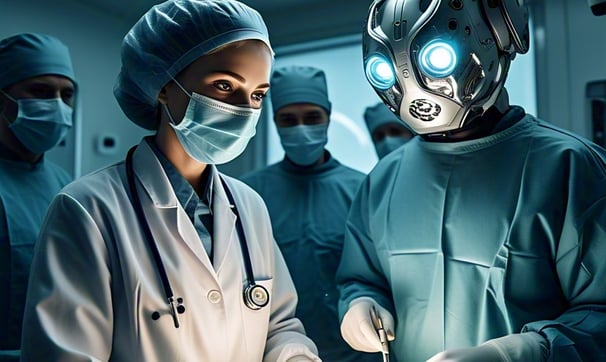The Amazing World of Robotic Surgery: When Robots Help Doctors Save Lives
TECHNOLOGY


Have you ever played a video game where you had to control a character to complete tricky tasks? Robotic surgery is a bit like that, but instead of playing a game, skilled surgeons use special robots to perform delicate operations with incredible precision. Let's explore how these amazing machines are changing medicine!
What is a Surgical Robot?
Picture a robot with several mechanical arms, each one thinner than a pencil. At the end of these arms are tiny surgical instruments and cameras. The surgeon sits at a special control station nearby, looking at a high-definition 3D screen that shows the inside of the patient's body. When the surgeon moves their hands, the robot's arms copy these movements exactly, but on a much smaller scale.
Why Use Robots for Surgery?
Imagine trying to tie your shoelaces while wearing thick winter gloves - it would be pretty hard! Now imagine if you had magical gloves that made your fingers tiny and super steady. That's similar to what robotic surgery does for doctors. The robots help surgeons in amazing ways:
The robot's arms never shake or get tired, even during long operations. They can make cuts smaller than a grain of rice. The special cameras let doctors see things up to ten times larger than normal. And the robot can even filter out tiny hand tremors, making every movement super smooth and precise.
How Does It Work?
The most famous surgical robot is called the da Vinci system (named after Leonardo da Vinci, who invented many machines). Here's how it works:
The surgeon sits at a control console, which looks a bit like a video game station with a 3D screen and special controllers. When they look into the screen, they see a crystal-clear, magnified view inside the patient's body. The surgeon's hands hold controls that work like high-tech joysticks. Every time they move their hands, the robot's arms move too, but with incredible precision.
The robot doesn't make decisions on its own - it's more like a very sophisticated tool that follows the surgeon's commands exactly. Think of it as giving the surgeon super-powers: the ability to see tiny details and make super-precise movements in very small spaces.
What Can Surgical Robots Do?
Today, robots help doctors perform many different kinds of operations:
Removing cancerous tumors
Fixing heart problems
Replacing worn-out joints
Helping people who need organ transplants
Making repairs inside the belly without having to make big cuts
Benefits for Patients
Robotic surgery often means:
Smaller cuts that heal faster
Less pain after the operation
Shorter time in the hospital
Getting back to normal activities sooner
Less scarring
Training to Be a Robotic Surgeon
Becoming a robotic surgeon takes lots of practice. Doctors first learn using special simulators, kind of like flight simulators that pilots use. These simulators let them practice operations without any risk to real patients. Some simulators even feel like video games, where doctors earn points for being precise and careful!
The Future of Robotic Surgery
Scientists and engineers are working on making surgical robots even better:
Some future robots might use artificial intelligence to help suggest the best ways to perform operations
Tiny robots smaller than a grain of rice might travel through blood vessels to fix problems
Doctors might be able to perform surgery on patients in different cities using robots connected through the internet
New types of cameras might let surgeons see things that normal cameras can't show
Fun Facts About Surgical Robots
Did you know:
The first surgical robot was used in 1985 - that's before many of your parents were born!
Some surgical robots have performed over a million operations
The tools used in robotic surgery can be so small they could pass through the eye of a needle
Could You Be a Future Robotic Surgeon?
If you're interested in robotic surgery, you could:
Learn about robotics and programming
Study biology to understand how the body works
Practice activities that need steady hands and good hand-eye coordination
Join science clubs or robotics teams at school
Remember...Even though robots are amazing, they're just tools - the real heroes are the skilled doctors who use them and the whole medical team that helps during surgery. Maybe someday you'll be one of the people who designs or uses these incredible machines to help save lives!
